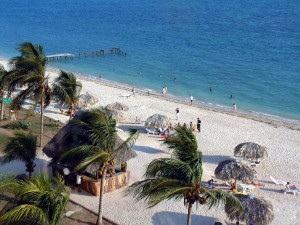 Visiting Cuba is on a lot of bucket lists, but the decades-old embargo & travel restriction between the island nation and the United States has made checking that one off illegal. At the same time, there are a lot of Americans who support the embargo, hoping that being cut off from the business and tourist benefits from the US will help topple an anti-democratic regime.
Visiting Cuba is on a lot of bucket lists, but the decades-old embargo & travel restriction between the island nation and the United States has made checking that one off illegal. At the same time, there are a lot of Americans who support the embargo, hoping that being cut off from the business and tourist benefits from the US will help topple an anti-democratic regime.
During his first term, President Obama opened up the borders slightly, allowing ‘people-to-people’ travel between the two countries. This has allowed select thousands of Americans to legally visit the island for the first time in a generation or more. This article about the effects of the decision tells the story of Americans and Cubans warming up to the idea of another.
A Philadelphia-based organization called Friendly Planet Travel has been promoting legal tours of Cuba, and distributed over 400 multiple choice surveys to Americans making the trip. The results? A large number of travelers believe US-Cuban relations should be open. That might make sense, as these are not Cuban hard-liners scheduling trips to the Caribbean nation. But there’s something more going on in these survey results that are worth looking at.
One interesting finding is how most people feel about Raul Castro’s government before they leave and after they return. Before leaving, nearly half of the travelers felt the Cuba’s government was a ‘repressive Communist regime that stifles individuality and creativity.’ After they returned, only 20% felt the same way. What’s more, after the return, the new most-popular opinion, held by a third of travelers, that the Cuban government is ‘a failing government that is destined to fall.’ Bleak, but not quite as energetically negative. And nearly 90% of respondents said their trip has made them more likely to support ending the embargo.
Taking a harder look at these trips, though, is important. These tourists are not seeing the entire country. Travel within the country is not restricted as it is in North Korea, but there were no reports of meeting dissidents, or feeling the real brunt that Cuban economic policies have had on everyday life. In fact, tourists travel on air-conditioned buses and sleep in luxury hotels. Reports of expensive beans and the fact that adhesive bandages and other goods can be hard to find aside, travelers are seeing Cuba at its best, the way the Castro government wants it to be seen.
Only time will tell what impact, if any, these trips will have on relations between the two countries. At the very least, the people of the two nations are reporting that they are enjoying the cultural exchange that is occurring.